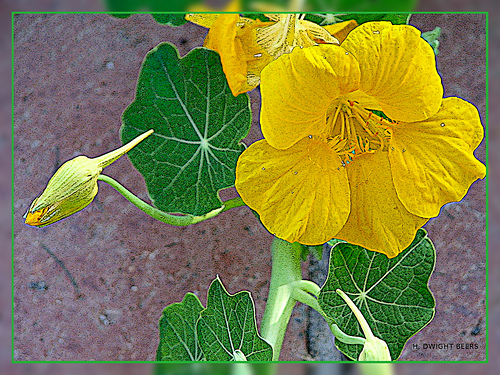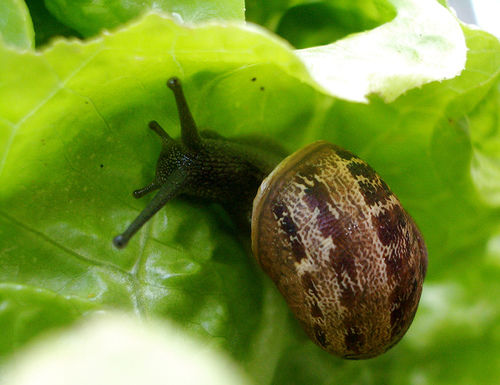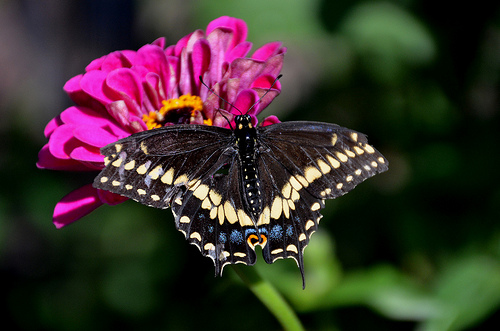Insects are often such a pain – especially when they are in your garden and all you want to do is protect the food you are growing. How do you get rid of these pesky invaders without a ton of insecticides? And can you do something, even here in Southwest Florida, that will be easy, clean and without a lot of extra hassle?
Believe it or not, there are actually a lot of home remedies that can help you rid your garden and plants of insects and bugs. You may have heard of a few of these already, but a few have been passed down from farmer to farmer, based on experience. If you don’t find your favorite garden trick below, please share it with us in the comments!
Romaine Lettuce Against Snails
Who knew snails love romaine lettuce as much as we do? When dusk starts settling in, place a few pieces of romaine lettuce at the base of your plants that has obvious snail damage. Leave it be overnight and when morning comes, you can collect the lettuce that now is full of snails. But you’ve got to get up early enough that it’s still cool and the slugs haven’t yet crawled back into their holes.
Poultry Grit Shreds Snails
No need to put harsh chemicals on your plants when poultry grit easily does the trick. Sprinkle poultry grit at the base of plants that have obviously been attacked with… yes, snails yet again. Make sure you circle the leaves if they also touch close to the ground. The poultry grit is a mixture of things, including crushed stones. The course texture of the stones cut the snails as they slide across it, thus aiding in their death. Snails gone, problem solved.
Gardenias Love Pickle Juice
Hold on, right there! If you are thinking of already throwing out your dill pickle juice because why else would you keep it, just stop for a minute. Head straight to where your gardenias are and pour a liberal amount. The juice helps to promote flowering with gardenias. Now, everything in that pickle jar is put to good use.
Basil Defends Tomatoes
Oh, basil! It goes so well with so many amazing recipes. But also, it helps to repel white flies, aphids and spider mites from your beloved garden tomatoes. This guide to basil plant care will teach you all you need to know to start growing basil in your garden.
Parsley Protects Asparagus
Nope, parsley isn’t just used to make your plate look beautiful. Plant them alongside your asparagus so the beetles don’t get to them first! They actually are very nutritious so it’s a win for you, but a loss for the beetles.
Black Swallowtail Butterflies Love Dill
The smell of the dill alone has special powers. It repels many insects and helps to keep them away. Did you know that dills are host plants to the black swallowtail? Well, it is! So not only do you get rid of insects, you also get to help the beautiful butterflies by providing them a host to lay their eggs on. Like hitting two birds with one stone.
Garlic Repels Beetles
While garlic smells so good with your meals, beetles do not feel the same way about them. Plant them around your blueberries, raspberries and roses to repel the mean beetles.
Marigolds Confuse Hornworm Moths
The best way to confuse hornworm moths and have them laying eggs elsewhere is by growing marigolds around your tomatoes. Now that the moths are dazed, your tomatoes are left to grown in peace.
Lavender Repels Aphids
Aaaaah lavender! The glorious smell of lavender is what everyone needs. But white flies and aphids might argue with that. Plant lavender by your leaf crops the intensity of its smell will keep your crops safe. And now you have a steady supply of lavender to keep your house smelling really really really good.
Nasturtiums Cultivate Cucumbers
Wow, that is a hard one to speak. However, this tongue twister of a plant name works well with cucumber vines to keep the beetles in check. Not only do they look amazing, they taste good too!

photo credit: h_dwight_beers via photopin cc
Lady Bugs and Lady Beetles Battle Aphids
Lady bug larvae are really helpful when it comes to aphids, white flies and other insects. While the adult ladies are also beneficial to your garden, the larvae consume the largest number of predatory bugs. Read more about this on
As we’ve shown in this post, all insects and bugs are bad. In fact, many of them are good for the garden in their own ways. You might even want to think about tweaking your garden a bit to encourage beneficial insects. But applying chemicals will get rid of both the good and the bad and you don’t want that. Hopefully with these tricks and the many others you’ll collect along the way, your garden will flourish and fill your table with lots of delicious produce!
Have a tip to share with us from your own gardening experiences? We’d love to read it in the comments below!





When I was younger and able to care for a huge organic garden my best method of pest control was the Guinea Fowl. You must be zoned to keep poultry before you can make use of their voracious appetites for insects and it helps if you’re hard of hearing because they are noisy birds. They disdain poultry houses and prefer to sleep in trees where they raise a ruckus if any human or animal comes anywhere close to them during the night.
I remember watching them patrolling my garden with their heads hung low and turned upside-down as they looked under the leaves on my potato plants for any invading beetles. You would occasionally find a tomato with a peck mark on it but their insect removal service was well worth that slight cost.
Another good thing about guineas is they are edible and also delicious. What more could you want in pest control, bug eating alarm systems that make a good meal. 🙂
I never heard of using poultry grit to get rid of snails before. It sounds as though it works in a similar way to food grade D.E. (sharp edges). I like the idea of Guinea Fowls with their insect removal service. Chickens are good at removing insects as well but will also trample on and eat mostly anything you have growing in your garden so may not be quite as good value as the Guineas 🙂
These are some lovely and very helpful ideas! I just started with companion gardening in my gardening and your post seems to be of a great help for me. Thank you for sharing all this nice info! Happy gardening!